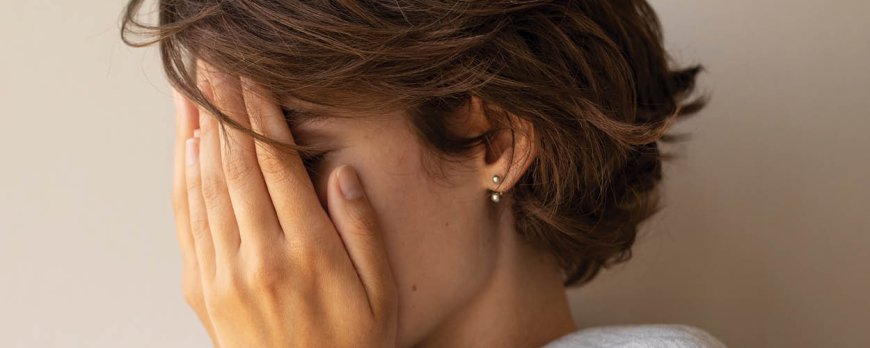Is it normal to have anxiety every day?
Is it normal to have anxiety every day? Uncover insights into daily anxiety, understand its triggers, and explore practical solutions for better living.

Is it normal to have anxiety every day?
It is common for individuals to experience occasional anxiety, but is it normal to have anxiety every day? While feeling anxious in response to potential dangers is a normal and adaptive response, experiencing constant or intense anxiety without a present danger may indicate an anxiety disorder.
Anxiety disorders encompass a range of conditions, including generalized anxiety disorder (GAD), phobia disorder, panic disorder, social anxiety disorder, and separation anxiety disorder. These disorders can contribute to the experience of anxiety on a daily basis, impacting various aspects of a person's life.
Key Takeaways:
- Occasional anxiety is normal, but experiencing anxiety every day could indicate an anxiety disorder.
- Anxiety disorders include GAD, phobia disorder, panic disorder, social anxiety disorder, and separation anxiety disorder.
- Symptoms of anxiety disorders include excessive worry, fear, restlessness, difficulty concentrating, fatigue, irritability, sleep disruption, and physical symptoms.
- Seeking professional help is important if anxiety interferes with daily life.
- Treatment options for anxiety disorders may include psychotherapy, medication, support groups, and lifestyle changes.

Understanding Anxiety Disorders
Anxiety disorders are a group of conditions that can lead to experiencing anxiety on a daily basis. These disorders can significantly impact a person's quality of life and well-being. Understanding the different types of anxiety disorders is crucial in identifying and managing daily anxiety effectively.
Types of Anxiety Disorders
- Generalized Anxiety Disorder (GAD): GAD is characterized by excessive and uncontrollable worry about various aspects of life, often without a specific trigger.
- Phobia Disorder: Phobia disorder involves an intense fear of a specific object, situation, or activity, which can lead to avoidance behaviors.
- Panic Disorder: Panic disorder is characterized by recurrent panic attacks, which are sudden and intense periods of fear or discomfort.
- Social Anxiety Disorder: Social anxiety disorder involves an intense fear of social situations, leading to avoidance or extreme discomfort when interacting with others.
- Separation Anxiety Disorder: Separation anxiety disorder is commonly experienced in children but can persist into adulthood. It is characterized by excessive fear or distress when separated from attachment figures.
It is essential to recognize the symptoms associated with anxiety disorders, including physical, cognitive, and emotional manifestations.
Symptoms of Anxiety Disorders
- Excessive worry
- Fear
- Restlessness
- Difficulty concentrating
- Fatigue
- Irritability
- Sleep disruption
- Panic attacks
- Physical symptoms like increased heart rate and sweating
- Avoiding situations that cause anxiety
Recognizing these symptoms is essential for individuals to seek appropriate professional help and management strategies to improve daily functioning.
Recognizing the symptoms
Symptoms of anxiety disorders can manifest in various ways, impacting daily life. Excessive worry is a common symptom, where individuals experience persistent and uncontrollable thoughts that often exaggerate potential threats. Feelings of fear and restlessness may also be present, making it difficult to relax or concentrate on tasks. Fatigue and irritability can result from the constant state of anxiety, affecting overall well-being and relationships.
Physical symptoms such as increased heart rate, sweating, and trembling may accompany anxiety. Sleep disruption is another common symptom, with individuals experiencing difficulty falling asleep or staying asleep due to racing thoughts or feelings of unease. Panic attacks, characterized by sudden and intense episodes of fear, can be distressing and overwhelming.
In an effort to avoid situations that cause anxiety, individuals may start to withdraw socially or limit their activities. This can lead to feelings of isolation and impact daily functioning. If you or someone you know is experiencing these symptoms and they are interfering with everyday life, it is important to seek professional help.
Recognizing the symptoms is the first step towards understanding and managing anxiety disorders. Seeking professional help can provide guidance and support in finding the most effective treatment approach for a better quality of life.

Triggers for Daily Anxiety
Daily anxiety can be influenced by a range of triggers, including personal and external factors. Identifying these triggers is crucial for understanding and managing anxiety on a daily basis. Here are some common triggers that may contribute to experiencing anxiety every day:
- Stress: High levels of stress, whether related to work, school, relationships, or other life events, can significantly impact anxiety levels. Stressful situations can activate the body's stress response, leading to increased feelings of anxiety.
- Trauma: Past traumatic experiences can leave a lasting impact on mental health, making individuals more prone to anxiety. Traumatic events such as accidents, abuse, or witnessing violence can trigger anxiety symptoms on a daily basis.
- Genetics: Some individuals may have a genetic predisposition to anxiety disorders. If there is a family history of anxiety, it increases the likelihood of experiencing anxiety on a regular basis.
- Environmental Influences: Certain environmental factors, such as living in a high-stress environment or constantly being exposed to triggers that cause anxiety, can contribute to experiencing daily anxiety.
- Underlying Health Conditions: Physical health issues like chronic pain, hormonal imbalances, or neurological disorders can coexist with anxiety disorders and exacerbate daily anxiety symptoms.
It is important to note that triggers for daily anxiety can vary greatly from person to person. What may cause anxiety in one individual may not have the same effect on another. Therefore, it is essential to pay attention to personal triggers and work with a healthcare professional to develop coping strategies tailored to individual needs.
Seeking Professional Help for Anxiety Treatment
If anxiety is significantly impacting your daily life, it may be beneficial to seek professional help. Anxiety disorders can be challenging to manage alone, and consulting with a mental health professional can provide the guidance and support needed for effective treatment. There are various options available for anxiety treatment, and a professional can help determine the most suitable approach based on your specific needs.
What are the benefits of seeking professional help?
- Expertise: Mental health professionals have the knowledge and experience to diagnose and treat anxiety disorders. They can assess your symptoms, provide an accurate diagnosis, and create a personalized treatment plan tailored to your unique situation.
- Therapeutic Techniques: Mental health professionals are trained in various therapeutic techniques, such as cognitive-behavioral therapy (CBT) and exposure therapy. These evidence-based approaches can help you better understand and manage your anxiety, develop coping skills, and challenge negative thought patterns.
- Medication Management: In some cases, medication may be prescribed to help alleviate symptoms of anxiety. A mental health professional can evaluate whether medication is necessary, prescribe appropriate medications, and monitor their effectiveness and potential side effects.
- Support and Guidance: Dealing with anxiety can feel overwhelming, and having the support of a mental health professional can make a significant difference. They can offer guidance, provide a safe space for you to express your concerns, and assist you in developing strategies to cope with anxiety triggers.
Other Treatment Options
Aside from professional help, there are additional strategies you can incorporate into your daily life to manage anxiety. These include:
- Practicing deep breathing exercises to promote relaxation
- Engaging in regular physical exercise, which can help reduce stress and boost mood
- Listening to calming music or engaging in other relaxation techniques
- Making healthy food choices that support overall well-being
- Managing media consumption and taking breaks from technology to reduce exposure to anxiety-inducing content
- Establishing good sleep hygiene practices to ensure restful sleep
Remember, seeking professional help is crucial if anxiety is significantly impacting your daily life. With the guidance and support of a mental health professional, along with incorporating healthy lifestyle changes, you can effectively manage and reduce anxiety, leading to a better quality of life.

Psychotherapy for Anxiety Management
Psychotherapy can be an effective approach to managing daily anxiety and improving overall well-being. It offers individuals a safe and supportive space to explore their thoughts, emotions, and behaviors related to anxiety. One commonly used form of psychotherapy for anxiety disorders is cognitive-behavioral therapy (CBT). CBT focuses on identifying and challenging negative thought patterns and beliefs that contribute to anxiety. By changing the way we think, CBT can help reduce anxiety symptoms and improve coping strategies.
Another effective psychotherapy approach for anxiety management is exposure therapy. This type of therapy involves gradually exposing individuals to their feared situations or objects in a controlled and supportive environment. Through repeated exposure, individuals can learn to understand that their anxiety can diminish over time, leading to a decrease in overall anxiety levels.
Benefits of Psychotherapy for Anxiety Management:
- Provides a safe and supportive environment to discuss and explore anxiety-related thoughts and emotions
- Equips individuals with coping strategies and tools to manage anxiety in daily life
- Helps individuals identify and challenge negative thought patterns and beliefs that contribute to anxiety
- Offers guidance and support in gradually confronting feared situations or objects
- Assists in improving overall well-being and quality of life
It is important to remember that everyone is unique, and what works for one person may not work for another. Therefore, it may be necessary to explore different types of psychotherapy and consult with a mental health professional to determine the most suitable approach for managing daily anxiety.
Medication Options for Anxiety
Medication can be utilized as part of a comprehensive treatment plan for managing daily anxiety. When anxiety symptoms become severe or significantly impact daily functioning, medication may be prescribed by a healthcare professional. It is important to note that medication should be used in conjunction with other forms of therapy, such as psychotherapy, to achieve optimal results.
Several types of medications are commonly prescribed for anxiety disorders. Selective serotonin reuptake inhibitors (SSRIs) and serotonin-norepinephrine reuptake inhibitors (SNRIs) are often the first line of drug treatment. They work by increasing the levels of certain neurotransmitters in the brain, which can help regulate mood and alleviate anxiety. Some commonly prescribed SSRIs include fluoxetine (Prozac), sertraline (Zoloft), and escitalopram (Lexapro). SNRIs like venlafaxine (Effexor) and duloxetine (Cymbalta) are also effective in managing anxiety.
Common Medications for Anxiety:
- Benzodiazepines: These medications are prescribed for short-term relief from severe anxiety symptoms. However, they are not typically recommended for long-term use due to the potential for dependence and withdrawal symptoms. Examples include alprazolam (Xanax) and lorazepam (Ativan).
- Buspirone: This medication is used to treat generalized anxiety disorder and is preferred for long-term use, as it is less likely to cause dependency. It works by affecting the chemicals in the brain that contribute to anxiety.
- Beta-blockers: These medications are primarily used to treat physical symptoms of anxiety, such as increased heart rate and sweating. They can be effective in managing performance anxiety or specific phobias.
It is important to consult with a healthcare professional to determine the most suitable medication option for individual needs. Medication for anxiety should always be taken as prescribed and any concerns or side effects should be promptly discussed with the prescribing doctor.

Lifestyle Changes and Self-Help Techniques
Incorporating lifestyle changes and self-help techniques can contribute to managing daily anxiety. By making small adjustments to daily habits and adopting coping strategies, individuals can find relief from persistent anxiety symptoms. Here are some practical steps that can be taken:
- Practice deep breathing: Deep breathing exercises, such as diaphragmatic breathing, can help calm the nervous system and reduce anxiety. Taking slow, deep breaths while focusing on the sensation of breath can help promote relaxation.
- Engage in regular exercise: Physical activity releases endorphins, which are natural mood-boosting chemicals. Regular exercise can help reduce anxiety symptoms and improve overall well-being. Find an activity that you enjoy, whether it's walking, yoga, dancing, or any other form of exercise.
- Listen to relaxing music: Music has been shown to have a soothing effect on the mind and body. Create a playlist of calming music or nature sounds that you can listen to when feeling anxious. Incorporate this into your daily routine or use it as a relaxation tool whenever needed.
Healthy habits:
Make healthy food choices: A balanced diet can have a positive impact on mental health. Opt for nutrient-rich foods that support brain function, such as fruits, vegetables, whole grains, lean proteins, and healthy fats. Limit the intake of caffeine and alcohol, as they can exacerbate anxiety symptoms.
Manage media consumption: Constant exposure to news and social media can increase anxiety levels. Set boundaries for screen time and create designated periods for disconnecting from technology. Engage in activities that help you relax and unwind, such as reading, practicing a hobby, or spending time in nature.
Practice good sleep hygiene: Quality sleep is essential for physical and mental well-being. Establish a regular sleep schedule, create a soothing bedtime routine, and ensure your sleep environment is comfortable and conducive to rest. Avoid stimulating activities, caffeine, and electronics before bed to promote restful sleep.
Take technology breaks: Constant connectivity can contribute to feelings of overwhelm and anxiety. Schedule regular breaks from technology, such as turning off notifications or setting specific times to check emails and social media. Use this time to engage in activities that promote relaxation and connection with the present moment.
Remember, managing daily anxiety is a journey that may require a combination of self-help techniques, professional support, and ongoing commitment. Everyone's experience with anxiety is unique, so it's important to find what works best for you. By incorporating these lifestyle changes and self-help techniques, you can take steps towards managing your anxiety and finding greater peace of mind.
Importance of Support Networks
Building a strong support network can provide valuable assistance in managing anxiety on a daily basis. Surrounding yourself with understanding and supportive individuals can help alleviate feelings of isolation and provide a safe space to share your experiences.
One effective way to establish a support network is by joining anxiety support groups, either in-person or online. These groups offer a sense of belonging and the opportunity to connect with others who are going through similar challenges. Sharing your experiences, listening to others, and receiving advice and encouragement can be immensely empowering.
- Support networks can also include close friends and family members who can offer a listening ear and emotional support. Sometimes, simply talking about your anxiety with someone you trust can provide relief and a fresh perspective.
- Engaging in self-care activities, such as practicing mindfulness exercises, participating in hobbies, or engaging in physical activities like yoga or meditation, can also be a part of your support network. These activities can help reduce stress and promote overall well-being.
- When seeking support, it is crucial to communicate your needs and boundaries clearly. Let your support network know how they can help, whether it's offering a listening ear, accompanying you to therapy sessions, or providing practical assistance during challenging times.
Remember, building and maintaining a support network takes time and effort. Be patient and understanding, both with yourself and others. Together, with the support of your network, you can navigate the challenges of anxiety and strive for a happier, healthier life.
Conclusion
While daily anxiety may not be considered within the range of "normal," understanding its causes and seeking appropriate help and support can lead to improved daily functioning and well-being.
Experiencing constant or intense anxiety without a present danger may indicate an anxiety disorder. Common anxiety disorders include generalized anxiety disorder (GAD), phobia disorder, panic disorder, social anxiety disorder, and separation anxiety disorder.
Symptoms of anxiety disorders can include excessive worry, fear, restlessness, difficulty concentrating, fatigue, irritability, sleep disruption, panic attacks, physical symptoms like increased heart rate and sweating, and avoiding situations that cause anxiety.
It is important to seek professional help if anxiety is interfering with daily life. Treatment for anxiety disorders may involve psychotherapy, medication, support groups, and healthy lifestyle changes such as practicing deep breathing, exercising, listening to relaxing music, making healthy food choices, managing media consumption, practicing good sleep hygiene, and taking technology breaks.
FAQ
Q: Is it normal to have anxiety every day?
A: Feeling anxious on a daily basis may indicate an anxiety disorder, which should be addressed by a professional.
Q: What are the different types of anxiety disorders?
A: Common anxiety disorders include generalized anxiety disorder (GAD), phobia disorder, panic disorder, social anxiety disorder, and separation anxiety disorder.
Q: What are the symptoms of anxiety disorders?
A: Symptoms of anxiety disorders can include excessive worry, fear, restlessness, difficulty concentrating, fatigue, irritability, sleep disruption, panic attacks, physical symptoms like increased heart rate and sweating, and avoiding anxiety-inducing situations.
Q: What triggers daily anxiety?
A: Daily anxiety can be triggered by factors such as stress, trauma, genetics, environmental influences, and underlying health conditions.
Q: When should I seek professional help for anxiety?
A: It is important to seek professional help if anxiety is interfering with your daily life and functioning.
Q: How can psychotherapy help manage anxiety?
A: Psychotherapy, such as cognitive-behavioral therapy (CBT) and exposure therapy, can help individuals cope with and reduce daily anxiety.
Q: Are there medication options for anxiety?
A: Medication can be prescribed to manage anxiety disorders and may be used in conjunction with other forms of therapy. It is important to consult with a healthcare professional to determine the most appropriate medication for your specific needs.
Q: What lifestyle changes can reduce daily anxiety?
A: Practices such as deep breathing exercises, regular exercise, relaxation techniques, healthy eating habits, managing media consumption, improving sleep hygiene, and taking breaks from technology can help reduce daily anxiety.
Q: How important are support networks in managing daily anxiety?
A: Having a supportive network, joining support groups, and seeking social support from friends and family can be crucial in managing daily anxiety.
Q: What is the key takeaway about anxiety experienced every day?
A: While experiencing anxiety every day may not be considered "normal," seeking professional help and utilizing coping mechanisms are essential for better daily living.


































































































































